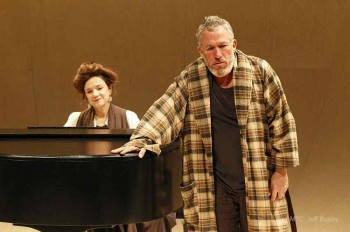MTC: Needs a tune up
Music's another play about middle-aged, wealthy middle class academics who think their lives are empty, so it has to be in the MTC program.

Jack (Richard Piper) is a retired 50- or 90-something academic who has has weeks to live, his wife Margie (Janet Andreawartha) doesn't care and has a Schubert recital to prepare for, his doctor and friend Max (Paul English) is shagging Margie and asking Jack for feedback on his short stories, and Jack's brother Peter (Robert Menzies) is a miserable Catholic priest who hasn't seen Jack in three years. There's ranting about the dumbing down of the English department, affairs, grief over a child, the accidental description of the quilt from a lover's marital bed in the writing given to the cuckolded husband, and everyone decides that it's time to tell the truth about things that really don't matter when you or someone you sorta like has days to live.
As Billy Connolly describes dull folk as beige wearers, Music wears a beige elastic-waisted fleece pant with a matching cardi.
With writing that brings attention to itself with atrociously awkward alliteration and rhymes that even students fro
m the dumbed down English/Cultural Studies department would roll their eyes at, it's a story made from cliches worthy of a daytime soap. No, I take that back, the melodrama of soap is addictive and surprising in its outrageous inventiveness. There's nothing unexpected in this tale.
Dull story choices aside, what's missing is the heart and relationships that make us care. Situation doesn't make character and exchanging smart-arse comments, well-read quotes and a Les Murray joke doesn't make dialogue. Relationships are made in the subtext, the things not said that say so much more than the chosen words. While each told secrets (that the other knew), the space between the characters was empty, which left them feeling no more complex than the jaded academic, out-of-love wife, miserable priest and wanna-be-writer doctor who appeared at the start.
Then there's the music. In the program notes, writer Barry Oakley says the music's used “more or less” like in opera. My snobby reaction was to wonder if he'd ever been to an opera. Then I read on. Despite the Beyreuth and Wager references (Hitler liked him, you know), the writer jokes that he “couldn't sit though the entire Ring Cycle – all those hours and hours, days of music”. At least that explains why the music is nothing like an opera and sounds and feels as inspired and relevant as a Top Twenty Tunes for Old Farts cassette from the bargin bin at Big W.
Over at Malthouse, there's another story about middle aged, wealthy, jaded academics. In Wild Surmise, he has cancer, she's had an affair. It's pretty much the same story, but this one soars.

